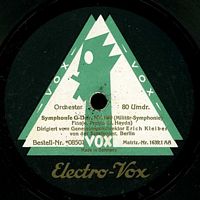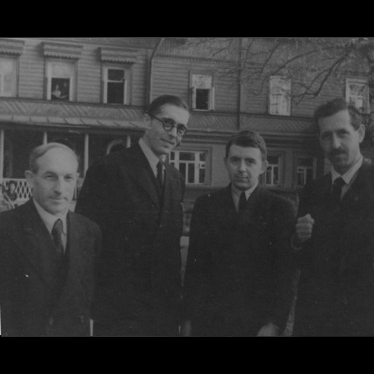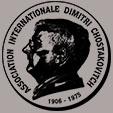Étiquette : Mahler

Dimitri Mitropoulos Kölner Rundfunk Sinfonie Orchester
Lucretia West, mezzo-soprano
Kölner Rundfunkchor dir: Bernhard Zimmermann
Kölner Domchor dir: Adolf Wendel
Köln Funkhaus Saal 1 – 31 Oktober 1960
Source: Bande/Tape 38 cm/s / 15 ips
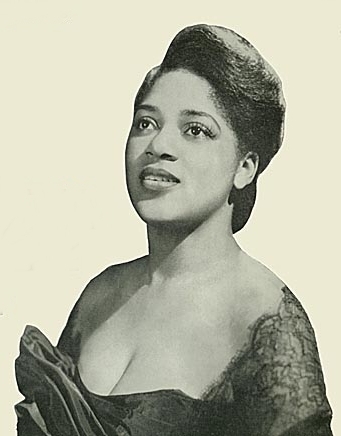
Lucretia West
Ce fut donc le dernier concert de Dimitri Mitropoulos, qui en dépit de son état de santé, s’était imposé pendant l’été et l’automne 1960 une programmation très chargée, qui est reconstituée ici pour la première fois.
Au Festival de Salzburg 1960, il donne deux concerts triomphaux (Mendelssohn Symphonie n°3, Schoenberg Variations Op.31 et Debussy La Mer le 21 août, et la Symphonie n°8 de Mahler le 28 août). Ensuite, Il dirige au Wiener Staatsoper six représentations (23, 27 et 30 septembre; 7, 12 et 15 octobre) de la Forza del Destino de Verdi qualifiées de géniales par la presse autrichienne, entrecoupées avec les Wiener Philharmoniker de deux programmes à la Musikvereinsaal, d’une part les 1 et 2 octobre (Mahler Symphonie n°9), et d’autre part les 8 et 9 octobre (Schumann Symphonie n°2, Th. Berger Jahreszeiten et Debussy La Mer). Ces deux programmes sont redonnés au cours d’une courte tournée, le 10 à Graz pour le premier, et le 11 à Linz pour le deuxième.
Il se rend ensuite à Cologne pour une série de quatre concerts avec l’Orchestre Symphonique de la WDR (Kölner Rundfunk Sinfonie Orchester).
Le premier de ceux-ci, le 24 octobre, reprend le programme salzbourgeois du 21 août avec le BPO, et le second, le 31 octobre, est donc consacré à cette Troisième de Mahler. Lors du concert du 31, il réussit à surmonter un malaise au cours du premier mouvement, mais il refuse cependant les avis pressants d’interrompre le concert après l’entracte qui suit le premier mouvement, acceptant seulement de diriger assis. En dépit de son état de fatigue extrême, il prend immédiatement après la fin du concert le train de nuit pour Milan où il doit diriger cette même Troisième le 7 novembre avec l’Orchestre de la Scala.
Le soir du 1er novembre, il rédige dans sa chambre d’hôtel milanaise une courte lettre à l’intention de l’épouse de Bruno Zirato*, Nina, qu’il poste le lendemain matin en se rendant à sa répétition avec l’Orchestre de la Scala: « Je suis ici à Milan, malheureux et mort de fatigue, et je m’inquiète de mon état de santé. Le climat de Cologne ne m’a pas fait de bien…. J’étais toujours à court de respiration. Chers amis, priez pour que je puisse retourner à New-York, et qu’ici je ne sois pas obligé d’aller à l’hôpital. Votre malheureux Dimitri ».
Le décès de Mitropoulos au cours de la répétition du 2 novembre a été rapporté dans l’ouvrage de Willam R. Trotter « Priest of Music The Life of Dimitri Mitropoulos« .
Karl O. Hoch (WDR – Leiter der Hauptabteilung Musik) annonce dans son hommage radiophonique que le chef venait d’accepter sa nomination comme Directeur Musical du Kölner Rundfunk Sinfonie Orchester. On ne connaît pas les programmes des deux autres concerts prévus à Cologne les 14 et 21 novembre.
Mitropoulos avait également des engagements à New-York avec le New-York Philharmonic et le Metropolitan Opera**. Il s’agissait tout d’abord d’un prestigieux concert supplémentaire qui avait été décidé probablement début octobre et pour lequel un accord avait été finalisé le 18 octobre: le « Pension Fund Concert » du 18 décembre avec une rencontre qui promettait d’être exceptionnelle avec le pianiste Sviatoslav Richter (Beethoven Concerto n°1 et Brahms Concerto n°2). Deux répétitions avaient été prévues le 14 et le 17 en tenant compte des engagements que Mitropoulos avait avec le Metropolitan Opera.
Le 28 octobre, le concert a été mis en location par correspondance. L’administration a été submergée par les demandes de billets, et plus de 2000 chèques ont dû être retournés aux souscripteurs. Le concert a finalement été dirigé par Bernstein et Richter a joué Liszt (Concerto n°2) et Tchaïkovski (Concerto n°1).
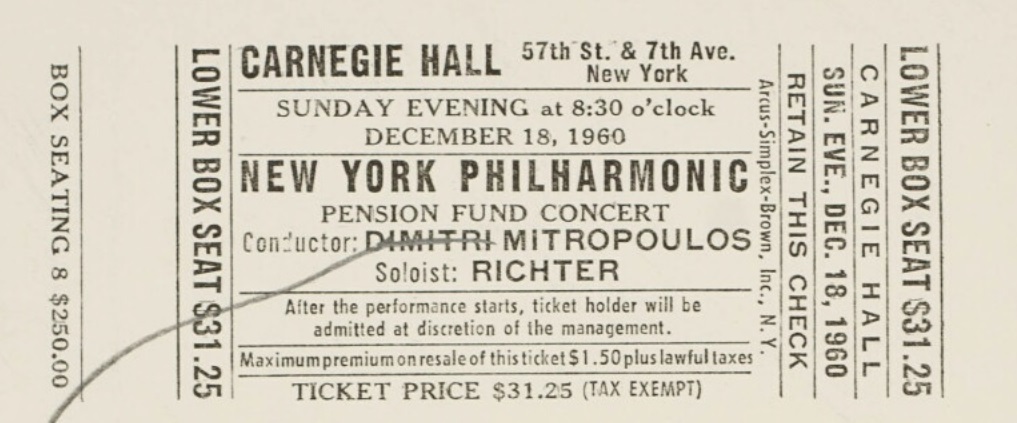
Pour la saison 1960-1961, Dimitri Mitropoulos avait des engagements pour quatre semaines de concerts successives avec le NYPO:
I – 29 et 30 décembre 1960 1er janvier 1961: Mahler Symphonie n°3 avec Martha Lipton. Le chef de chœur Hugh Ross propose de faire répéter ensemble un chœur féminin (27) du Berkshire Music Center (plutôt que la Schola Cantorum de New-York) et un chœur d’enfants (25) de la High School of Music and Art.
II – 5, 6 ,7 et 8 janvier 1961: Bach-Schoenberg Prélude et Fugue en mi mineur; Katchaturian Concerto pour violoncelle avec Rohan de Saram; Scriabine Prométhée (Poème du Feu) Op.60.
III – 12, 13, 14 et 15 janvier 1961: Mendelssohn Symphonie n°3; Krenek Medea avec Blanche Thebom; Gould Dialogues pour piano et orchestre à cordes avec Morton Gould; Skalkottas Danses Grecques.
IV – 19, 20, 21 et 22 janvier 1961: Beethoven Symphonie n°2; Berg 3 Pièces pour orchestre Op.6; Prokofiev Concerto pour piano n°3 Zadel Skolovsky; Berlioz Rob Roy, Ouverture.
Ces concerts, reprogrammés dans l’urgence, ont été assurés avec des programmes presque entièrement différents, par Stanislav Skrowaczewski pour les deux premiers et Paul Paray pour les deux suivants.
La Troisième de Mahler a été donnée plus tard, les 30 et 31 mars, et les 1 et 2 avril 1961 sous la direction de Leonard Bernstein, à la mémoire de Dimitri Mitropoulos.
Trois ans après son départ de la direction du NYPO, l’attitude de l »administration de l’orchestre à son égard avait changé. Les succès rencontrés au Met ainsi qu’en Europe (Festival de Salzburg, Wiener Staatsoper, WDR Köln) y ont vraisemblablement été pour beaucoup. Un autre indice de ce relatif rapprochement se trouve dans le fait que, pour ses concerts de l’été et de l’automne 1960, Mitropoulos avait emprunté au NYPO la partition orchestrale et le matériel d’orchestre de « La Mer » de Debussy. Après son décès, eut lieu un échange de courrier inquiet entre Joan Bonime (NYPO) et Karl O. Hoch (WDR) pour récupérer ces précieux documents, ce qui eut lieu effectivement dans les semaines qui suivirent. A noter que Mitropoulos, qui dirigeait par cœur, avait laissé la partition dans son appartement de New-York, et n’avait emmené en Europe que le matériel d’orchestre!
Les enregistrements radiophoniques qui nous restent de cette période (les deux concerts de Salzburg, la représentation de la Forza del Destino du 23 septembre au Wiener Staatsoper, la Neuvième de Mahler avec le WPO le 2 octobre et les deux concerts avec l’Orchestre de la WDR Köln avec la magnifique prestation de Lucretia West dans Mahler) sont d’inestimables documents.
* Bruno Zirato était jusqu’en 1959 l’Administrateur Général du New-York Philharmonic. Cette lettre a été publiée dans un article commémoratif signé par Bruno Zirato, inclus dans le programme du Metropolitan Opera du 5 décembre 1960. Mitropoulos avait des engagements au « Met » pour le mois de décembre, mais aucune documentation n’est disponible à ce sujet.
** Le 2 novembre, avant la représentation de Boris Godounov au « Met », l’orchestre joue sans chef la Danse des Esprits Heureux de l’ « Orfeo ed Euridice » de Gluck et Rudolf Bing s’adresse au public en ces termes: « Une autre grande tragédie a frappé le Metropolitan Opera et en fait le monde musical. Notre bien-aimé Dimitri Mitropoulos est décédé ce matin à Milan. Vous l’aimiez tous et vous savez qu’il était un des grands musiciens et un des grands chef d’orchestre de notre temps, ainsi qu’un extraordinaire être humain. Sa perte est personnellement ressentie par chacun au Metropolitan – en fait tous les membres de cet orchestre étaient ses amis. Bien sûr le Metropolitan Opera va continuer et d’autres grands chefs pourraient aller et venir, mais il y aura toujours dans nos cœurs une place spéciale pour Dimitri Mitropoulos «
__________________
This was Dimitri Mitropoulos’ last concert. In spite of his health condition, he drove himself hard during the summer and the autumn of 1960 with a heavy schedule, reconstructed here for the first time.
At the 1960 Salzburg Festival, he gives two triumphal concerts (Mendelssohn Symphony n°3, Schoenberg Variations Op.31 and Debussy La Mer on August 21, and Mahler Symphony n°8 on August 28). Then, he conducts at the Wiener Staatsoper six performances (September 23, 27 and 30 and October 7, 12 and 15) of Verdi’s « La Forza del Destino » de Verdi considered by the Austrian press as a stroke of genius, interleaved with two programs at the Musikvereinsaal with the Wiener Philharmoniker on the one hand on October 1 and 2 (Mahler Symphony n°9), and on the other hand on October 8 and 9 (Schumann Symphony n°2, Th. Berger Jahreszeiten and Debussy La Mer). These two programs are performed again during a short tour on October 10 in Graz for the first one, and on October 11 in Linz for the second.
Thereafter, he travels to Cologne for a series of four concerts with the WDR Sinfonie Orchester (Kölner Rundfunk Sinfonie Orchester).
The first of them, on October 24, has the same program as the BPO August 21 Salzburg concert, and the second, on October 31, is then dedicated to the Mahler’s Third. During the October 31 concert, he succeeds in overcoming a stroke during the first movement, but however refuses the urging advices against resuming the concert after the intermission following the first movament, only accepting to conduct seated. After the end of the performance, in spite of his high state of exhaustion, he takes the night train to Milan where he is to conduct that same Third Symphony with La Scala Orchestra on November 7.
On the evening of November 1st, he writes in his Milan hotel room a short letter to Bruno Zirato’s wife*, Nina, which he mails the next morning while going to his rehearsal with the Scala Orchestra: « Here I am in Milano. I am miserable, dead tired, and I am worried over the state of my health. The climate in Cologne did me no good…. I was always short of breath. Dear friends, please pray that I will be able to return to New York, and not be forced to enter a hospital here. Your unhappy Dimitri ».
Mitropoulos’ death during the November 2 rehearsal has been told in Willam R. Trotter’s book « Priest of Music The Life of Dimitri Mitropoulos« .
Karl O. Hoch (WDR – Leiter der Hauptabteilung Musik) announces in his broadcast tribute that the conducter has accepted to become Music Director of the Kölner Rundfunk Sinfonie Orchester. The programs of the other two Cologne concerts on November 14 and 21 are not known.
Mitropoulos was also to perform in New-York with the New-York Philharmonic and the Metropolitan Opera**. Firstly, it was a prestigious supplementary concert that was probably decided at the beginning of October and for which an agreement was finalized on October 18: the December 18 « Pension Fund Concert » with an exceptionally promising meeting with pianist Sviatoslav Richter (Beethoven Concerto n°1 and Brahms Concerto n°2). Two rehearsals were set on December 14 and 17 to take care of Mitropoulos’ schedule with the Metropolitan Opera.
On October 28, a mail order was launched. The administration was overflooded with orders for tickets and more than 2,000 cheques had to be returned to subscribers. The rescheduled concert was conducted by Bernstein and Richter played Liszt (Concerto n°2) and Tchaïkovski (Concerto n°1).

For the 1960-1961 season, Dimitri Mitropoulos was to perform during four successive weeks with the NYPO:
I – December 29 and 30, 1960 and January 1st, 1961: Mahler Symphony n°3 with Martha Lipton. Choir director Hugh Ross suggested to make joint rehearsals with a women choir (27) from the Berkshire Music Center (rather than from the Schola Cantorum of New York) and a children choir (25) of the High School of Music and Art.
II – January 5, 6 ,7 and 8, 1961: Bach-Schoenberg Prelude and Fugue in E flat; Katchaturian Cello Concerto with Rohan de Saram; Scriabin Prometheus (Poem of Fire) Op.60.
III – January 12, 13, 14 and 15, 1961: Mendelssohn Symphony n°3; Krenek Medea with Blanche Thebom; Gould Dialogues for piano and string orchestra with Morton Gould; Skalkottas Greek Dances.
IV – January 19, 20, 21 and 22, 1961: Beethoven Symphony n°2; Berg 3 Orchestra Pieces Op.6; Prokofiev Piano Concerto n°3 Zadel Skolovsky; Berlioz Rob Roy, Overture.
These concerts, hastily rescheduled, were given with almost entirely different programs by Stanislav Skrowaczewski for the first two and Paul Paray for the next two.
The Mahler Third was performed later on March 30 and 31 and on April 1 and 2, 1961 under the direction of Leonard Bernstein, in Memory of Dimitri Mitropoulos.
Three year after he left the NYPO as its Music director, the administration of the orchestra saw him differently. His success at the Met as well as in Europe (Salzburg Festival, Wiener Staatsoper, WDR Köln) were most certainly very instrumental. Another sign of this better relationship may be found in the fact that, for his 1960 summer and autumn concerts, Mitropoulos borrowed to the NYPO the orchestral score and the orchestral parts of « La Mer » by Debussy. After his death, an anxious exchange of letters took place between Joan Bonime (NYPO) and Karl O. Hoch (WDR) to get back these precious documents, which successfully happened during the next weeks. It is worth noting that Mitropoulos, who conducted by heart, left the orchestral score in his New York flat, and only brought with him to Europe the orchestral parts!
The broadcast recordings that have survived from that period (both Salzburg concerts, the Wiener Staatsoper performance of La Forza del Destino on September 23, the Mahler Ninth with the WPO on October 2 and both WDR Köln concerts, including Lucretia West beautifully singing Mahler) are as many historical documents.
* Bruno Zirato was until 1959 the General Manager of the New-York Philharmonic. This letter was published as part of a tribute signed by Bruno Zirato, in the December 5, 1960 program of the Metropolitan Opera. Mitropoulos was to conduct at the « Met » during the month of December, but it is not documented.
** On November 2, before the performance of Boris Godounov at the « Met », the orchestra plays without a conductor the Dance of the Blessed Spirits from « Orfeo ed Euridice » by Gluck and Rudolf Bing talks to the public with these words: « Another great tragedy has befallen the Metropolitan Opera and indeed the musical world. Our beloved Dimitri Mitropoulos died this morning in Milan. You all loved him, and you know he was one of the great musicians and great conductors of our time, and also an outstanding human being. His loss is felt personally by everyone at the Metropolitan – indeed all the members of this orchestra were his friends. Naturally the Metropolitan Opera will go on and other great conductors may come and go, but there will always be a very special place in our hearts for Dimitri Mitropoulos.«
Les liens de téléchargement sont dans le premier commentaire. The download links are in the first comment.
Maureen Forrester, contralto
Boston Symphony Orchestra Charles Munch
Boston Symphony Hall – December 27 1958
Source: Bande/Tape 19 cm/s / 7.5 ips
Les enregistrements de Maureen Forrester sont des joyaux de la discographie mahlérienne. On ne ne connait pas la raison du choix de Charles Munch pour diriger ces œuvres, car c’est quasiment la seule fois où, avec le BSO, il a abordé ce compositeur. Le fait est que le disque commercial qui en est résulté est réussi, tant du point de vue du chant que de la direction.
C’est la première fois que les Kindertotenlieder sont donnés par le BSO dans le cadre des concerts d’abonnements à Boston. Auparavant, Marcia Davenport les avait chantés en 1944 avec des membres du BSO sous la direction de Bernard Zighera, et en 1949 le Festival de Tanglewood les avait programmés avec Helen Spaet sous la direction d’Howard Shanet.
Mahler avait été précédemment beaucoup plus joué à Boston qu’on ne le pense:
Symphonie n°1: Monteux (1923), Mitropoulos (1936), Burgin (1942, 1943, 1955)
Symphonie n°2: Muck (1918), Bernstein (1948, 1949, 1953)
Symphonie n°4: Burgin (1945, 1954, 1957), Walter (1947)
Symphonie n°5: Gericke (1906); Muck (1913-1915), Koussevitzky (1937, 1938, 1940), Burgin (1948, 1951)
Symphonie n°7: Koussevitzky (1948)
Symphonie n°9: Koussevitzky (1931-1933, 1936, 1941), Burgin (1952)
Das Lied von der Erde: Koussevitzky (1928, 1930, 1936,1937, 1949), Burgin (1943, 1950)
Koussevitzky n’était pas du tout répertorié comme chef mahlérien, et après lui, la direction des œuvres de Mahler a été, au cours des années cinquante, surtout confiée à Richard Burgin, le « concert-master » de l’orchestre (notamment les Lieder eines fahrenden Gesellen en 1952), plutôt qu’à des chefs invités.
Le concert du 27 décembre 1958 est la plus ancienne archive conservée en stéréo du BSO en public. L’interprétation en concert se caractérise par une très grande écoute réciproque entre la soliste et les membres de l’orchestre que le chef laisse heureusement se développer. Rappelons que Munch a été pendant plusieurs années un des violons solo du Gewandhausorchester de Leipzig, qui était surtout l’orchestre de l’Opéra, et qu’en cette qualité, il avait acquis une grande expérience de l’accompagnement des solistes.
Le choix du reste du programme n’était pas particulièrement heureux. Pour terminer, Munch s’était en effet livré dans la Symphonie n°3 de Saint-Saëns à une des prestations spectaculaires qu’il affectionnait, ici relativement bien mise en place, et qui lui ont valu à la fois beaucoup de succès et beaucoup de critiques.
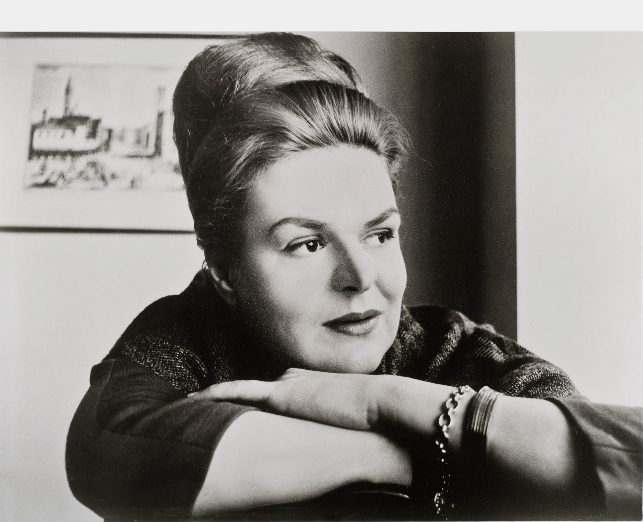
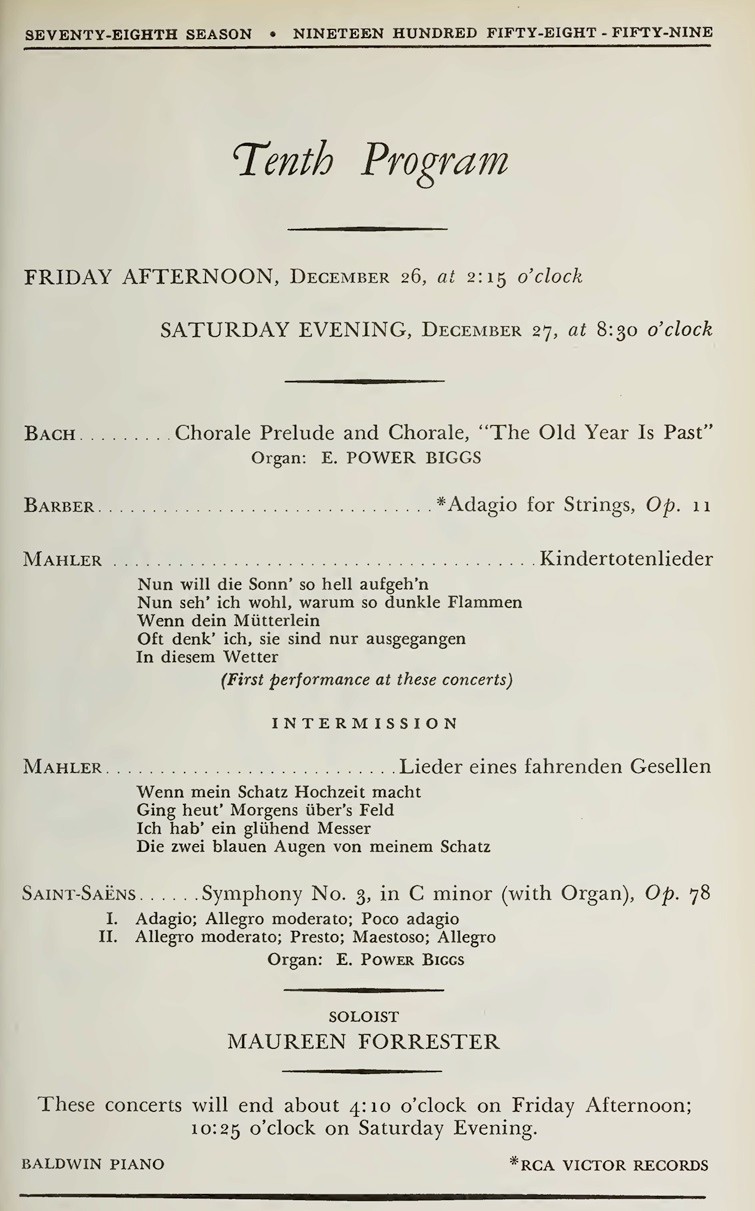
Maureen Forrester’s recordings are jewels of the Mahler discography. It is not known why Charles Munch was chosen to conduct these works, since it is the only time he conducted them, and almost the only time he conducted this composer with the BSO. Anyway, the commercial recording that came out of it was successful, for the singing as well as the conducting.
It was the first time that the Kindertotenlieder were performed at the BSO abonnement concerts. Earlier, Marcia Davenport sang them in 1944 with members of the BSO conducted by Bernard Zighera, and in 1949 they were performed at the Tanglewood Festival by Helen Spaet and conducted by Howard Shanet.
In Boston, Mahler was previously performed more than one thinks:
Symphony n°1: Monteux (1923), Mitropoulos (1936), Burgin (1942, 1943, 1955)
Symphony n°2: Muck (1918), Bernstein (1948, 1949, 1953)
Symphony n°4: Burgin (1945, 1954, 1957), Walter (1947)
Symphony n°5: Gericke (1906); Muck (1913-1915), Koussevitzky (1937, 1938, 1940), Burgin (1948, 1951)
Symphony n°7: Koussevitzky (1948)
Symphony n°9: Koussevitzky (1931-1933, 1936, 1941), Burgin (1952)
Das Lied von der Erde: Koussevitzky (1928, 1930, 1936,1937, 1949), Burgin (1943, 1950)
Koussevitzky did not have a reputation as a Mahler conductor, and after him, during the 50’s his works were mostly conducted by Richard Burgin, the orchestra « concert-master » (a.o. the Lieder eines fahrenden Gesellen in 1952), rather than by invited conductors.
The December 27, 1958 concert is the oldest stereo archive from the BSO live. The public performance shows a quite great mutual hearing between the soloist and the orchestra members which the conductor lets develop freely. For several years, Munch was one of the « Konzertmeister » of the Leipzig Gewandhausorchester, mainly performing at the Opera, and he then acquired a great experience with the accompaniment of singers.
The remainder of the program was not particularly well chosen. To end the concert, Munch delivered in Saint-Saëns’ Symphony n°3 one of the spectacular performances he was fond of, rather well in place, of a type that owned him plenty of successes as well as criticisms.
Les liens de téléchargement sont dans le premier commentaire. The download links are in the first comment.

New York Philharmonic Bruno Walter
Carnegie Hall – 24 Janvier 1954
Source: Bande/Tape 19 cm/s / 7.5 ips
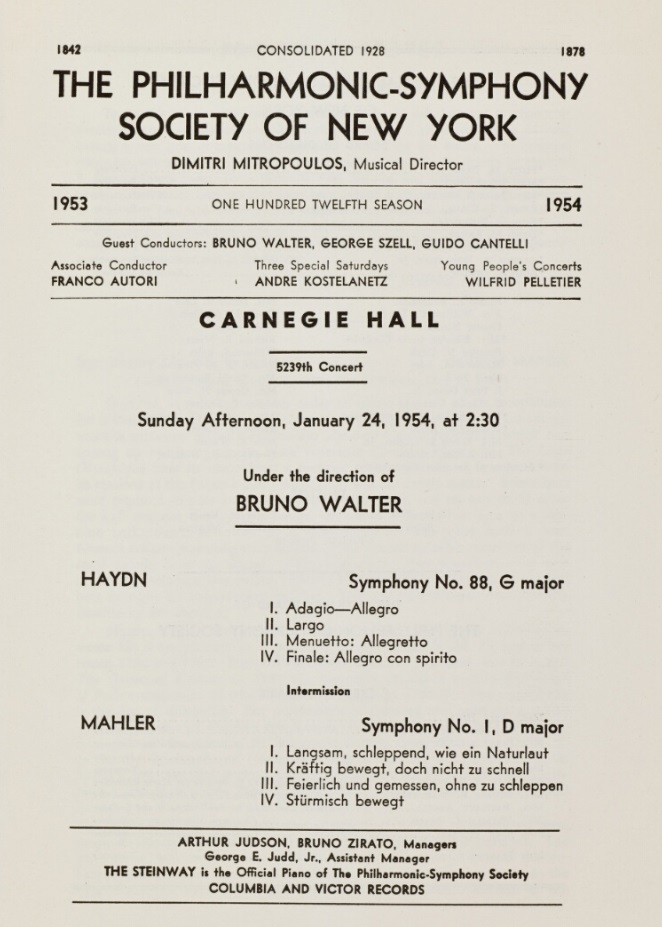
Bruno Walter a dirigé plusieurs fois cette symphonie avec le NYPO, et ce dès 1924 (les 28 et 29 février). Il la dirigea de nouveau en octobre 1933 (les 12, 13, 14, et 15), en octobre 1942 (les 22, 23, 24 et 25), en février 1950 (les 9, 10 et 12) et enfin une seule et unique fois en 1954, pour le concert radiodiffusé du dimanche 24 janvier depuis Carnegie Hall, suivi le lendemain par l’enregistrement pour Columbia dans cette même salle (plutôt que dans l’ habituel « Columbia 30th Street Studio »). Le concert public est plus vivant que sa contrepartie pour le disque. On remarque, à l’écoute de l’enregistrement du concert, une certaine sécheresse de l’acoustique de Carnegie Hall, que l’on ne perçoit pas dans la salle vide où le disque a été capté.
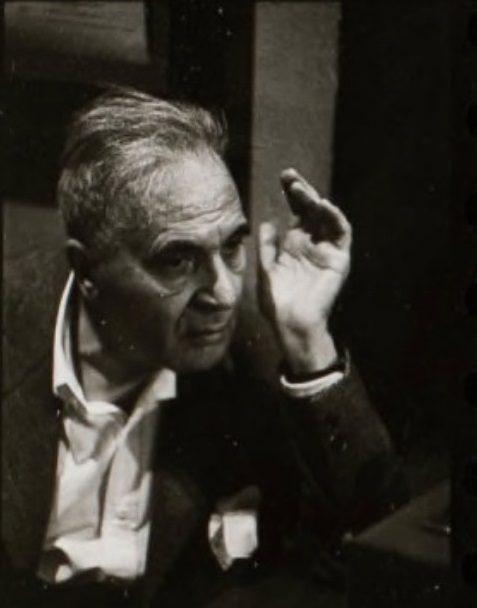
Bruno Walter conducted several times this symphony with the NYPO, as early as 1924 (February 28 and 29). He conducted it again in October 1933 (12, 13, 14, and 15), in October 1942 (22, 23, 24 and 25), in February 1950 (9, 10 and 12) and only once and for the last time in 1954, for the Sunday broadcast Concert of January 24 from Carnegie Hall, followed on the next day by the recording for Columbia in the same venue (rather than the usual « Columbia 30th Street Studio »). The live performance is more lively than its disc countertpart. When listening to the broadcast concert, one notes some dryness in the acoustics of Carnegie Hall, not to be found in the empty hall where the disc has been recorded.
Les liens de téléchargement sont dans le premier commentaire. The download links are in the first comment.
Brahms Lieder und Gesänge Op.32 n° 1-6 & 9 Hertha Klust piano
Berlin 25 mai 1955 – Prod: Fritz Ganss Eng: Horst Lindner
Mahler Lieder eines fahrenden Gesellen – Philharmonia Orchestra Wilhelm Furtwängler – London Kingsway Hall 24 & 25 juin 1952
Prod: Lawrence Collingwood Eng: Douglas Larter
Bande HMV 19cm/s 2 pistes HTB 409
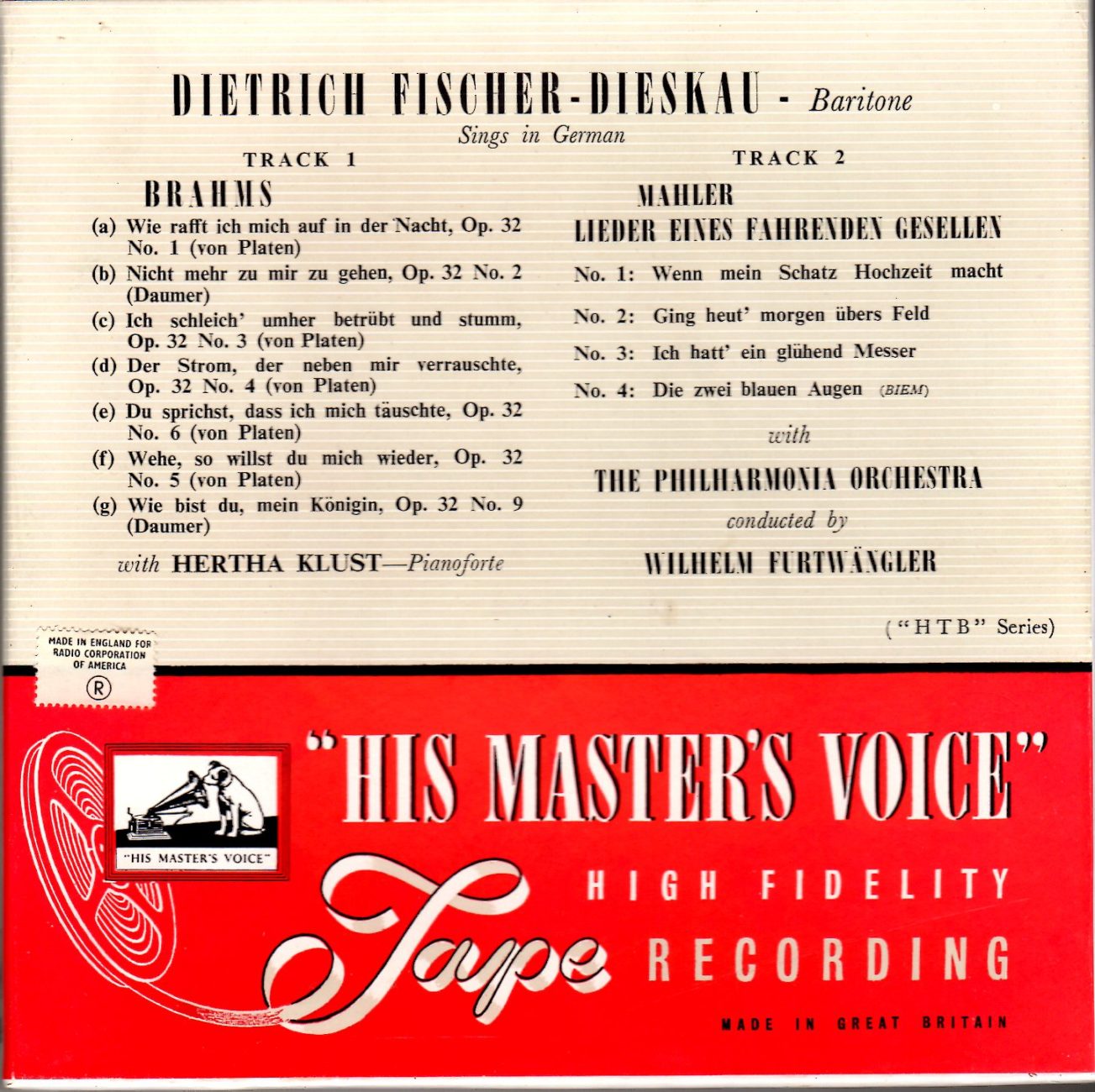
En 1956, HMV a publié ces enregistrements en microsillon (ALP 1270), mais aussi sous forme de bande magnétique HTB 409. Le couplage de ces deux œuvres est inhabituel, et ce d’autant plus que Fischer-Dieskau a enregistré en juin 1955 les Kindertotenlieder de Mahler avec le BPO sous la direction de Rudolf Kempe. Essayons d’en décrypter les raisons:
Les Lieder eines fahrenden Gesellen ont été enregistrés par Fischer-Dieskau et Furtwängler les 24 et 25 juin 1952 en profitant du temps d’enregistrement disponible après les séances consacrées à l’intégrale de Tristan und Isolde de Wagner.
Le 29 novembre 1953, Furtwängler écrit à Walter Legge en évoquant l’enregistrement du Monologue d’Amfortas en projet avec Fischer-Dieskau et le Philharmonia lors de sa venue à Londres en mars 1954: « J’imagine que les Lieder eines fahrenden Gesellen enregistrés avec Fischer-Dieskau n’ont toujours pas été publiés. Comme je fais dans les prochains jours les Kindertotenlieder avec Fischer-Dieskau à Berlin, ce serait semble-t-il une bonne idée de les enregistrer à la place du Monologue d’Amfortas si on dispose d’assez de temps ». Le 3 décembre, Legge confirme ce changement. De plus, entre les deux concerts de Furtwängler prévus avec le Philharmonia au Royal Festival Hall les 5 et 12 mars 1954, un étonnant Récital de Lieder de Schumann avait été programmé le 7 mars dans cette même salle avec Fischer-Dieskau et Schwarzkopf, Furtwängler étant au piano. Legge propose le programme suivant: Dichterliebe, Frauenliebe und Leben et 15 Duos.
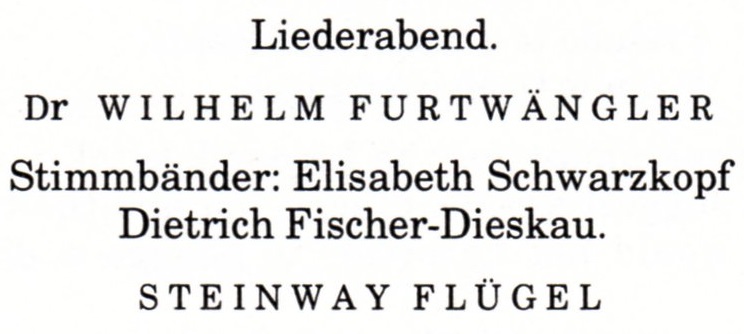
Le 12 janvier 1954, Furtwängler écrit à Legge depuis le sanatorium d’Ebersteinburg (Baden-Baden) où il doit séjourner pour se remettre des effets de ses traitements aux antibiotiques américains qu’il avait pris le mois précédent. Il a du annuler une tournée avec le BPO et une autre (au Portugal) avec le WPO, ainsi qu’une série d’autres concerts. Il annonce en outre qu’il ne pourra assurer à Londres que le concert du 12 mars. Il demande donc d’annuler le concert du 5 mars et le Récital du 7 mars. Le 18 janvier, Legge lui répond en exprimant ses regrets. Le 2 février, Furtwängler lui confirme qu’il ne dirigera que le concert du 12 mars et en confirme le programme. Le 7 février, Furtwängler écrit à Legge pour lui faire savoir que ses médecins l’autorisent finalement à reprendre ses activités le 1er mars et qu’il a programmé une série d’enregistrements avec le WPO (N.B. en fait du 28 février au 8 mars). Il n’est plus question d’enregistrer les Kindertotenlieder. Il n’en sera également pas fait état dans les échanges ultérieurs entre le chef et Legge.
Quant à Fischer-Dieskau, il recherchera activement, mais en vain, un enregistrement des Kindertotenlieder provenant des concerts berlinois de décembre 1953.
Dans ses mémoires, il laisse entendre qu’à l’époque il n’est pas satisfait de l’enregistrement qu’il en a fait avec Rudolf Kempe et le BPO en raison du manque d’entente entre l’orchestre et le chef. Ce sont probablement les raisons du choix du couplage Brahms/Mahler, grâce auquel la subtilité du piano d’Hertha Klust (1907-1970), que d’ailleurs Furtwängler appréciait beaucoup, mais dont la carrière fut semble-t-il abrégée par des problèmes auditifs, répondait à celle de la direction de Furtwängler.
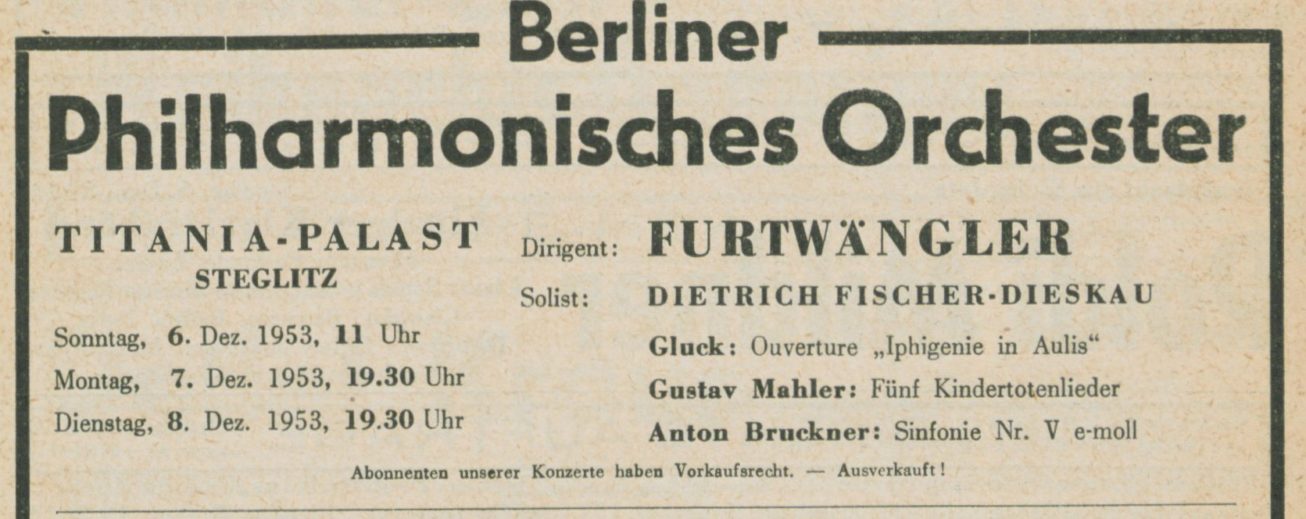
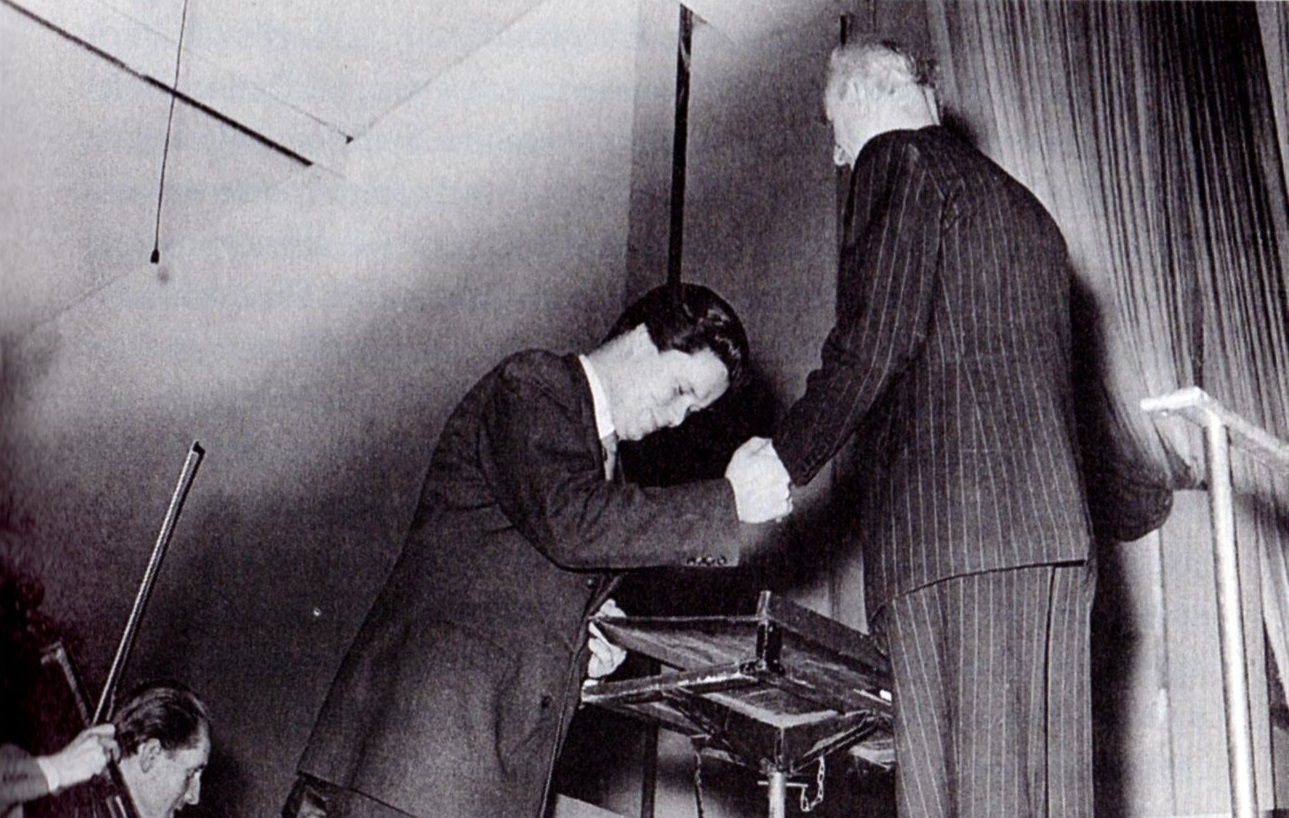
Dietrich Fischer-Dieskau & Wilhelm Furtwängler – Titania Palast Décembre 1953
______________
In 1956, HMV published these recordings as a LP (ALP 1270), but also on a reel-to-reel magnetic tape HTB 409. The coupling of these two works is unusual, al the more so, since Fischer-Dieskau recorded in June 1955 Mahler’s Kindertotenlieder with the BPO conducted by Rudolf Kempe. Let’s attempt an explanation:
The Lieder eines fahrenden Gesellen were recorded by Fischer-Dieskau and Furtwängler on June 24 and 25, 1952 during available recording time further to the sessions devoted to the complete recording of Wagner’s Tristan und Isolde.
On November 29, 1953, Furtwängler writes to Walter Legge and mentions the project recording of the Amfortasmonolog with Fischer-Dieskau and the Philharmonia during his stay in London in March 1954: « I gather that the Lieder eines fahrenden Gesellen with Fischer-Dieskau, which we recorded, have still not been released. As I am doing the Kindertotenlieder with Fischer-Dieskau in Berlin in the next few days, it would seem to be a good idea to record this as well – instead of the Amfortasmonolog – if there is time ». On December 3, Legge confirms the change. Moreover, between both Furtwängler’s concerts arranged with the Philharmonia at the Royal Festival Hall on March 5 and 12, 1954, an astonishing Recital of Lieder by Schumann had been scheduled on March 7 in the same venue with Fischer-Dieskau and Schwarzkopf, Furtwängler being the pianist. Legge suggests the following program: Dichterliebe, Frauenliebe und Leben and 15 Duets.

On January 12, 1954, Furtwängler writes to Legge from the Ebersteinburg sanatorium (Baden-Baden) were he has to stay to undergo a course of treatment which became necessary as a consequence of American antibiotics which were given to him the previous month. He had to cancel a tour with the BPO and another one (in Portugal) with the WPO, as well as a series of other concerts. He also mentions he will be able to conduct only the second London concert on March 12. As a consequence, he requests the cancellation of the March 5 concert as well as of the Recital of March 7. On January 18, Legge answers and expresses his regrets. On February 2, Furtwängler confirms he will conduct only the March 12 concert and also confirms the program. On February 7, Furtwängler writes to Legge to inform him that his doctors can discharge him as early as March 1st and that he has arranged with the WPO to do some recordings during that period (N.B. in fact between February 28 and March 8). It is no longer contemplated to record the Kindertotenlieder. Nor will this recording be further discussed in the next letters between the conductor and Legge.
As to Fischer-Dieskau, his active searches to find a recording of the Kindertotenlieder from the December 1953 Berlin concerts remained fruitless.
In his memoirs, the singer suggests that he was then not satisfied with the recording of this work he made with Rudolf Kempe and the BPO, because of the lack of understanding between the orchestra and the conductor. These are probably the reasons for the choice of the Brahms/Mahler coupling, thanks to which the subtility of the piano of Hertha Klust (1907-1970), whom by the way Furtwängler liked very much, but whose career was most probably shortened by hearing problems, mirrored that of Furtwängler’s conducting.
Les liens de téléchargement sont dans le premier commentaire. The download links are in the first comment.
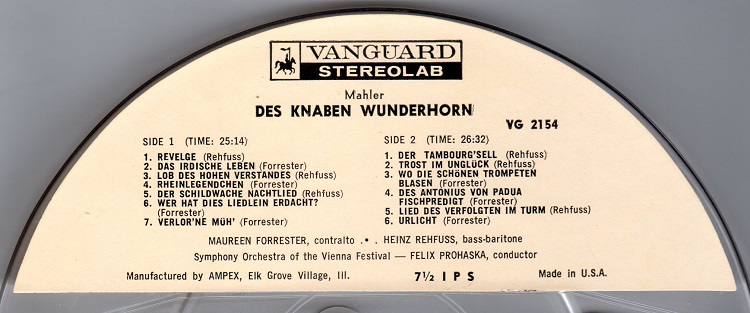
Enregistré au Konzerthaus de Vienne – 27 mai – 1er juin 1963
Source: Bande/Tape 19 cm/s 4 pistes/ 7.5 ips 4 tracks VG 2154
Il est presque inutile de présenter cet enregistrement, un des fleurons de la discographie de l’œuvre.
Il a été publié sur microsillons et sur CD, mais aussi sous forme de bande magnétique, et c’est cette édition qui est la plus convaincante.
Dans l’édition CD, l’Orchestre du Festival de Vienne a été identifié comme étant le Wiener Symphoniker (WSO).
La contralto canadienne Maureen Forrester (1930-2010) est une interprète de référence des œuvres de Mahler qu’elle a enregistrées avec des chefs aussi divers que Bruno Walter, Fritz Reiner, Ferenc Fricsay , Charles Münch, Bernard Haitink, Zubin Mehta et ici le chef autrichien Felix Prohaska (1912-1987). Elle a été, avec Kathleen Ferrier et Aafje Heynis, une des rares vrais contraltos du siècle dernier, et sur cette bande, sa voix de « bronze » est magnifiquement restituée.
Le baryton-basse allemand Heinz Rehfuss (1917-1988) a chanté un vaste répertoire de Bach à Luigi Nono. Il a enregistré des mélodies et des Lieder notamment avec le compositeur Frank Martin. Dans le domaine de l’Opéra, où il a joué plus de 80 rôles, il a notablement enregistré le Comte des « Nozze di Figaro », et Golaud de « Pelléas et Mélisande ».
_____________
Recorded at the Vienna Konzerthaus – May, 27 – June 1st 1963
Presenting this recording is almost useless, as it is one of the highlights of the discography of this work. It has been published on LP, on CD, but also on reel-to-reel tape, which is the most convincing.
In the CD edition, the « Vienna Festival Orchestra » is identified as being the Vienna Symphony Orchestra (WSO).
The Canadian contralto Maureen Forrester (1930-2010) is a reference performer of the Mahler compositions which she recorded with very different conductors, namely Bruno Walter, Fritz Reiner, Ferenc Fricsay, Charles Münch, Bernard Haitink, Zubin Mehta and here the Austrian conductor Felix Prohaska (1912-1987). She was with Kathleen Ferrier and Aafje Heynis one of the very few true contraltos of the last century, and on this tape, her « bronze » voice is sumptuously reproduced.
The German bass-baritone Heinz Rehfuss (1917-1988) has sung a vast repertoire from Bach to Luigi Nono. He has recorded melodies and Lieder especially with composer Frank Martin. In the field of Opera, in which he played more than 80 parts, his recordings of the Count in « Nozze di Figaro », and of Golaud in « Pelléas et Mélisande » are particuliarly noteworthy.
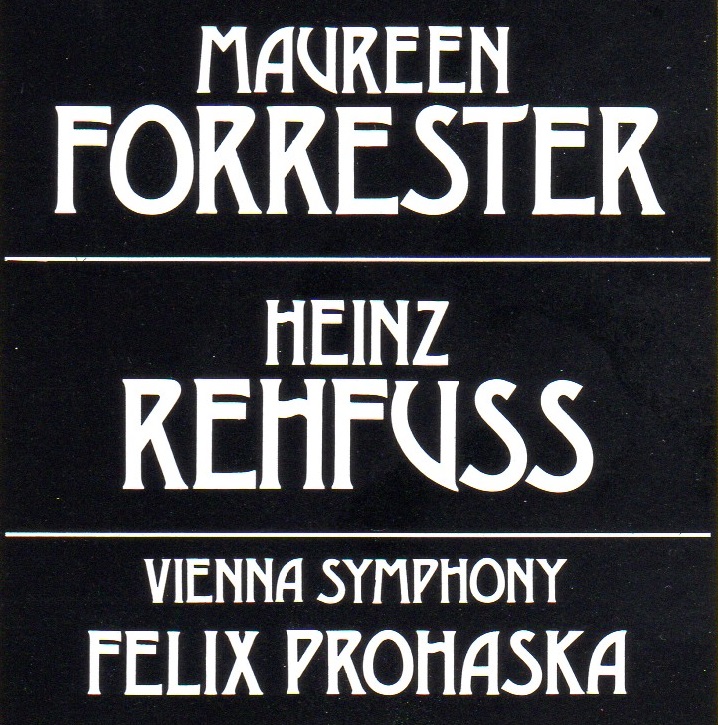
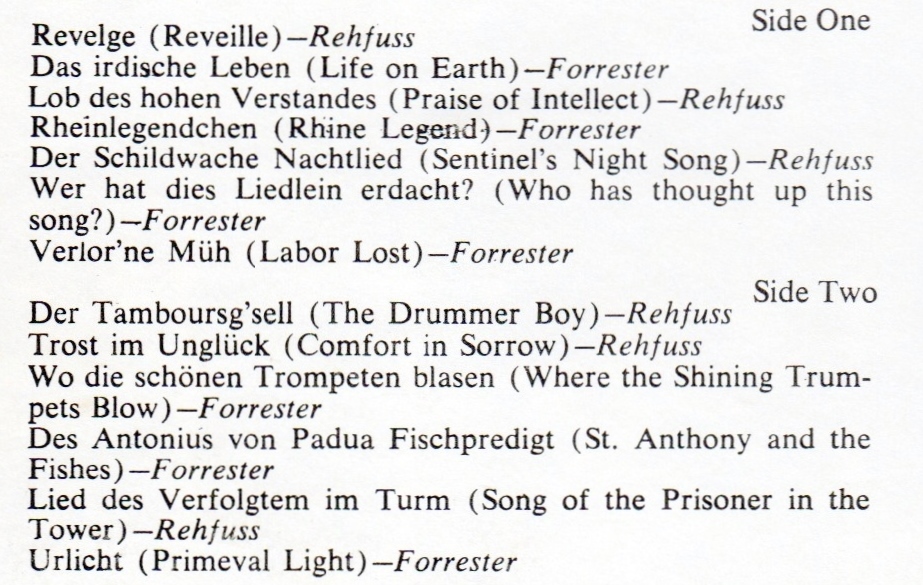
Les liens de téléchargement sont dans le premier commentaire. The download links are in the first comment.

